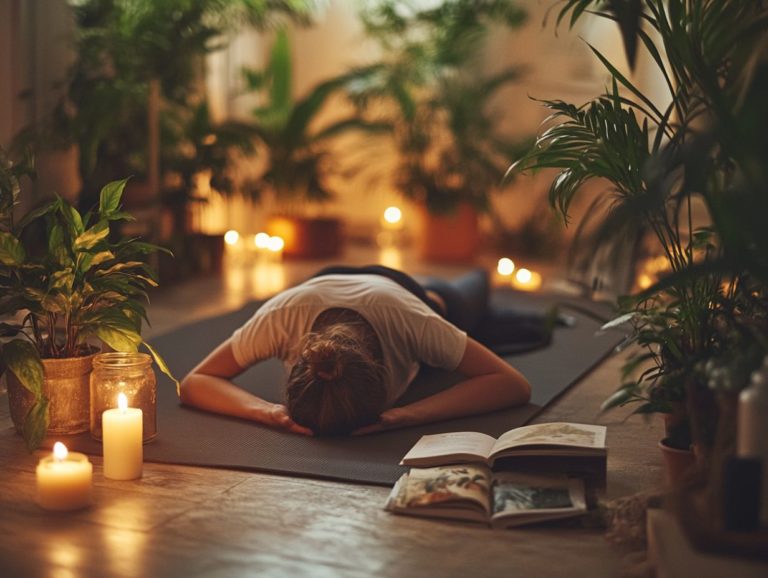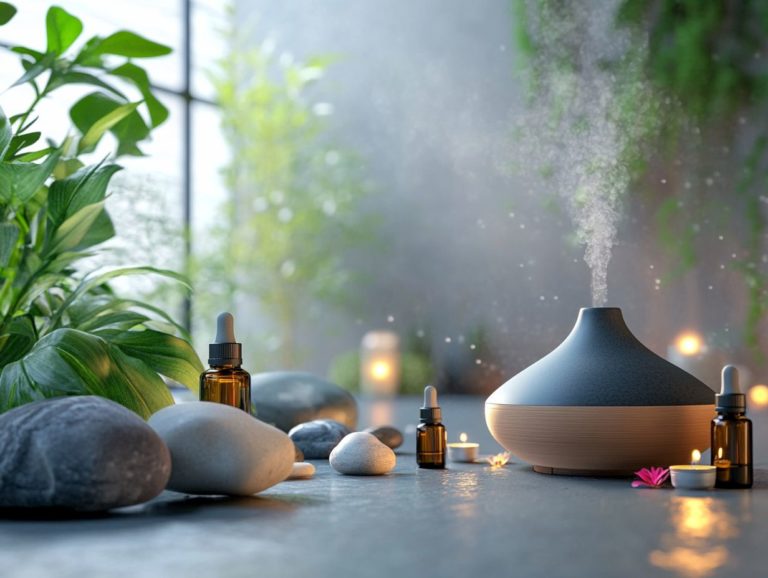Exploring the Benefits of Warm Baths for Relaxation
Warm baths have long been revered for their soothing effects, revealing many benefits that extend far beyond mere comfort. From alleviating stress and anxiety to enhancing sleep quality, immersing yourself in a warm bath can serve as a formidable ally in your quest for relaxation.
Get ready to explore the amazing benefits of warm baths! This guide provides insights on the ideal temperature and duration for your baths, and suggests how to elevate your experience with essential oils. You’ll also find tips for crafting the perfect calming atmosphere.
Dive in and uncover the secrets to transforming your bath time into a truly rejuvenating experience.
Contents
- Key Takeaways:
- The Science Behind Warm Baths
- Benefits of Warm Baths for Relaxation
- Find Your Perfect Bath Temperature and Time!
- Incorporating Essential Oils and Other Additives
- Tips for Creating the Perfect Atmosphere
- Frequently Asked Questions
- What are the benefits of taking warm baths for relaxation?
- How does a warm bath help with stress relief?
- Can taking a warm bath before bed improve sleep quality?
- Do warm baths have any physical benefits for personal well-being?
- How long should I soak in a warm bath for maximum relaxation and stress relief?
- Are there any precautions to keep in mind when taking a warm bath or using hot tub therapy?
Key Takeaways:
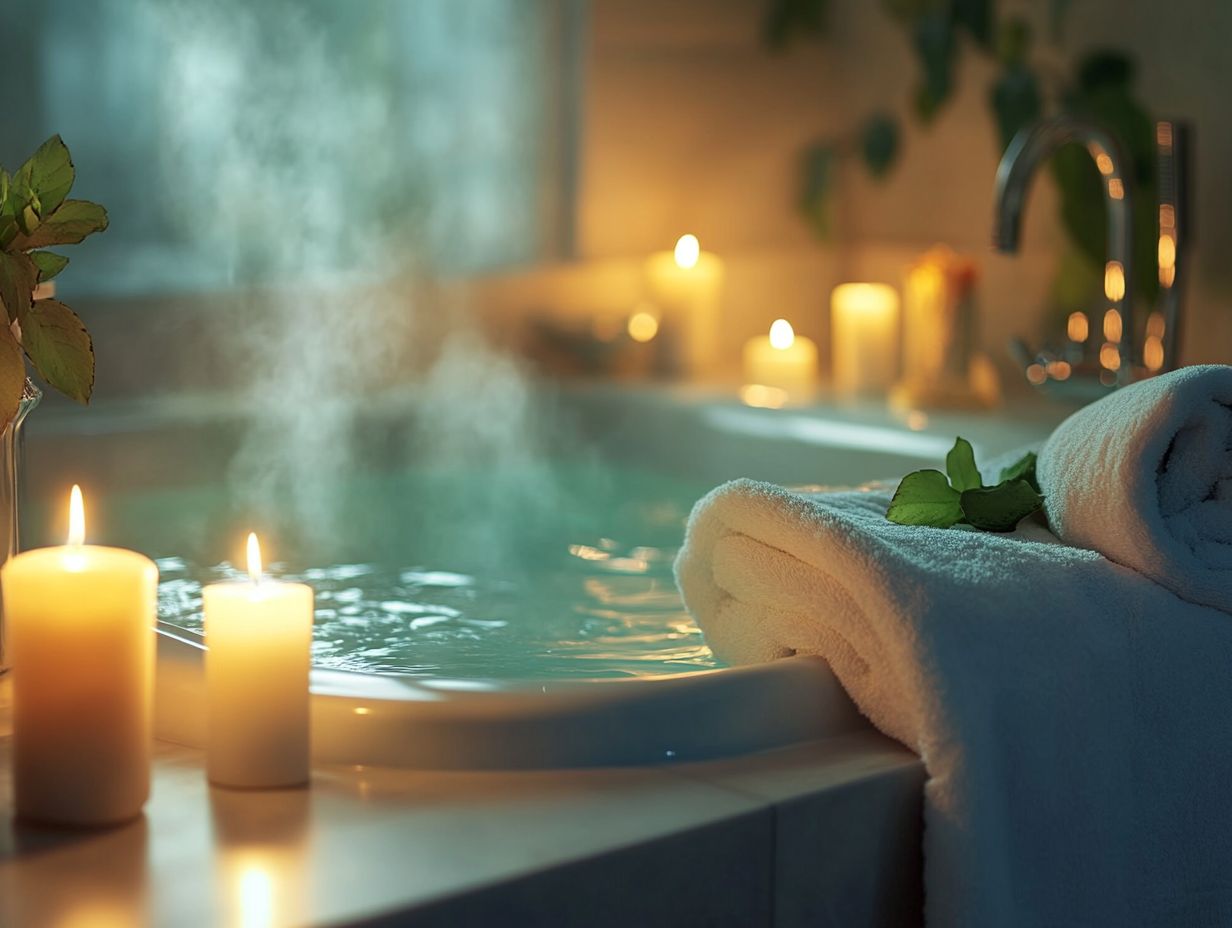
- Warm baths can help reduce stress and anxiety, making them a great relaxation tool.
- Soaking in warm water lowers the body s temperature and heart rate, promoting a better night s sleep.
- Incorporating essential oils and creating a calming atmosphere can enhance the relaxation experience of a warm bath.
The Science Behind Warm Baths
The science behind warm baths uncovers a wealth of health benefits beyond simple relaxation. When you soak in warm water, you not only enhance blood circulation but also alleviate muscle soreness, fostering an overall sense of well-being.
This makes warm baths an appealing option for those seeking effective relaxation techniques. Research from esteemed institutions like the Cleveland Clinic underscores how immersing yourself in warm water can positively influence core body temperature and stress hormones, ultimately contributing to improved mental health and physical recovery. Additionally, incorporating the benefits of laughter for relaxation can further enhance your overall well-being.
How Warm Baths Affect the Body
Warm baths work wonders for your blood circulation and overall well-being through the soothing embrace of consistent water immersion. This delightful ritual positively influences your core body temperature and seamlessly integrates into a balanced health routine.
As you settle into the warm water, you’ll notice increased blood flow, promoting relaxation and easing muscle tightness. This boost in circulation helps flush out toxins and reduce inflammation, creating the perfect environment for muscle recovery.
The gentle warmth enhances your skin’s barrier function, preventing moisture loss and promoting optimal hydration. These physiological benefits bolster your immune system and elevate your overall well-being by lowering stress levels and offering a calming effect on both your mind and body.
Benefits of Warm Baths for Relaxation
Indulging in warm baths presents an array of benefits for relaxation, serving as a highly effective means to alleviate stress and anxiety. This soothing experience nurtures your mental well-being and becomes an essential element of any self-care ritual.
Reduction of Stress and Anxiety
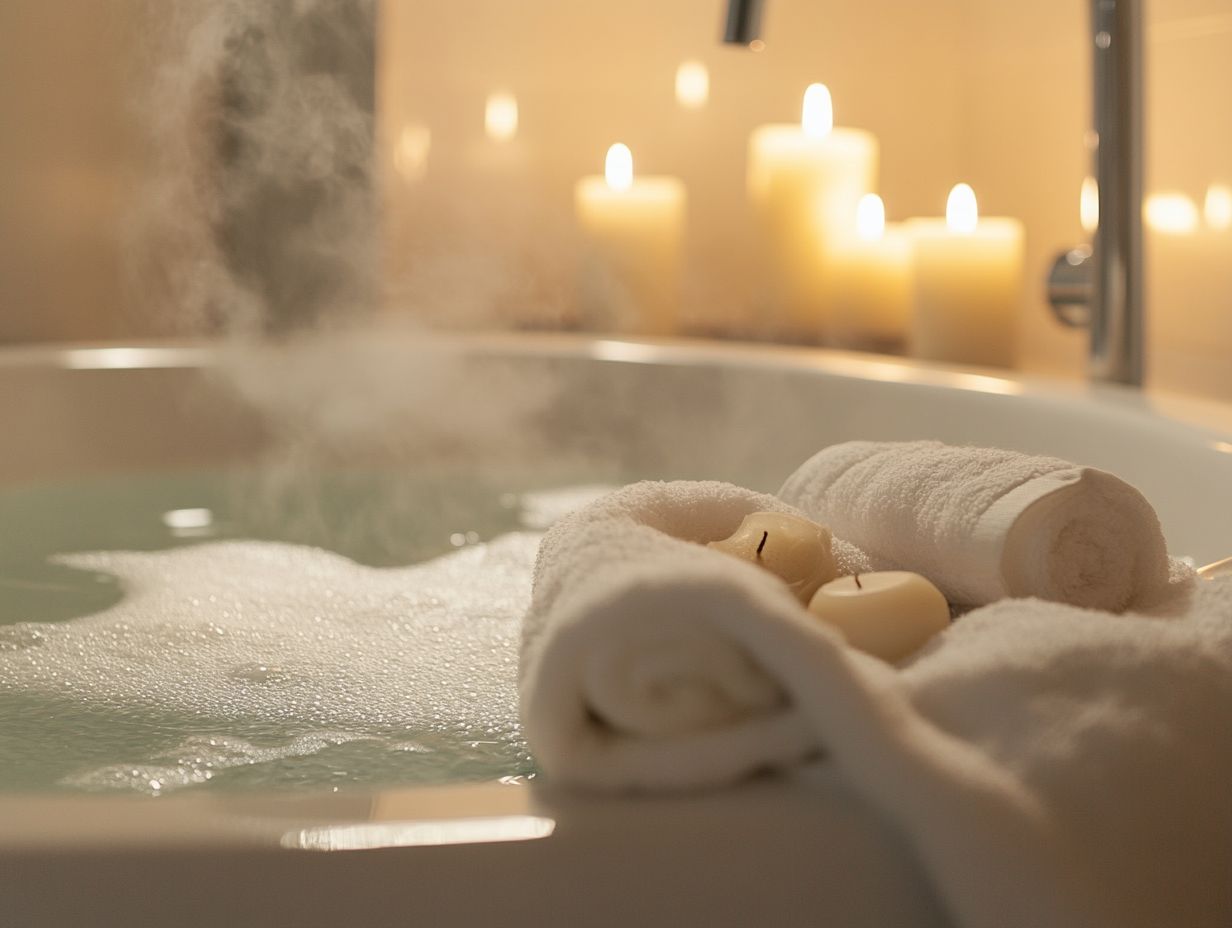
Indulging in warm baths is a remarkable way to relieve stress and reduce anxiety, offering a soothing experience that allows you to unwind and reconnect with your mental well-being.
The gentle warmth of the water not only relaxes tense muscles but also sends a reassuring message to your mind: it’s time to release the burdens of daily life. This practice beautifully complements various relaxation techniques and highlights the benefits of laughter for wellness, nurturing mindfulness and enhancing your overall sense of well-being.
Research indicates that immersing yourself in warm water can boost dopamine levels, often known as the “feel-good” hormone, further helping with alleviating anxiety. Many individuals who embrace this simple yet powerful routine report significant improvements in their mood and experience a profound sense of tranquility.
Ready to experience the relaxing benefits of warm baths for yourself? Light some candles, add your favorite essential oils, and soak your worries away!
Improved Sleep Quality
A warm bath before bedtime can significantly elevate your sleep quality by gently lowering your core body temperature and signaling to your body that it s time to unwind. This transformation enhances the nighttime bath experience, creating a soothing atmosphere.
As your temperature drops, your body naturally prepares for sleep, allowing for a smoother transition into restful slumber. These rituals help establish a strong sleep routine, enhancing your sleep quality and promoting overall wellness.
The calming embrace of warm water works wonders, reducing stress and anxiety. It encourages a peaceful mindset.
With consistent practice, these rituals can lead to improved physical and mental health.
Find Your Perfect Bath Temperature and Time!
Selecting the ideal temperature and duration for your warm bath is crucial for unlocking its many health benefits. This thoughtful approach enhances muscle recovery and elevates overall relaxation, allowing you to customize the experience to suit your unique needs.
Recommended Temperature and Time for Relaxation
For optimal relaxation, aim for a warm bath temperature between 92 F and 100 F. Spending 15 to 30 minutes in this soothing environment is particularly effective for muscle recovery and overall well-being.
This ideal temperature range, combined with the right duration, can significantly enhance your circulation and help ease sore, tense muscles. Many people find that integrating this practice into their health routines leads to improved flexibility and reduced stiffness.
Prioritizing muscle relaxation not only contributes to better sleep quality but also amplifies recovery. Try experimenting with different temperatures you’ll discover unique benefits tailored to your personal preferences!
Incorporating Essential Oils and Other Additives
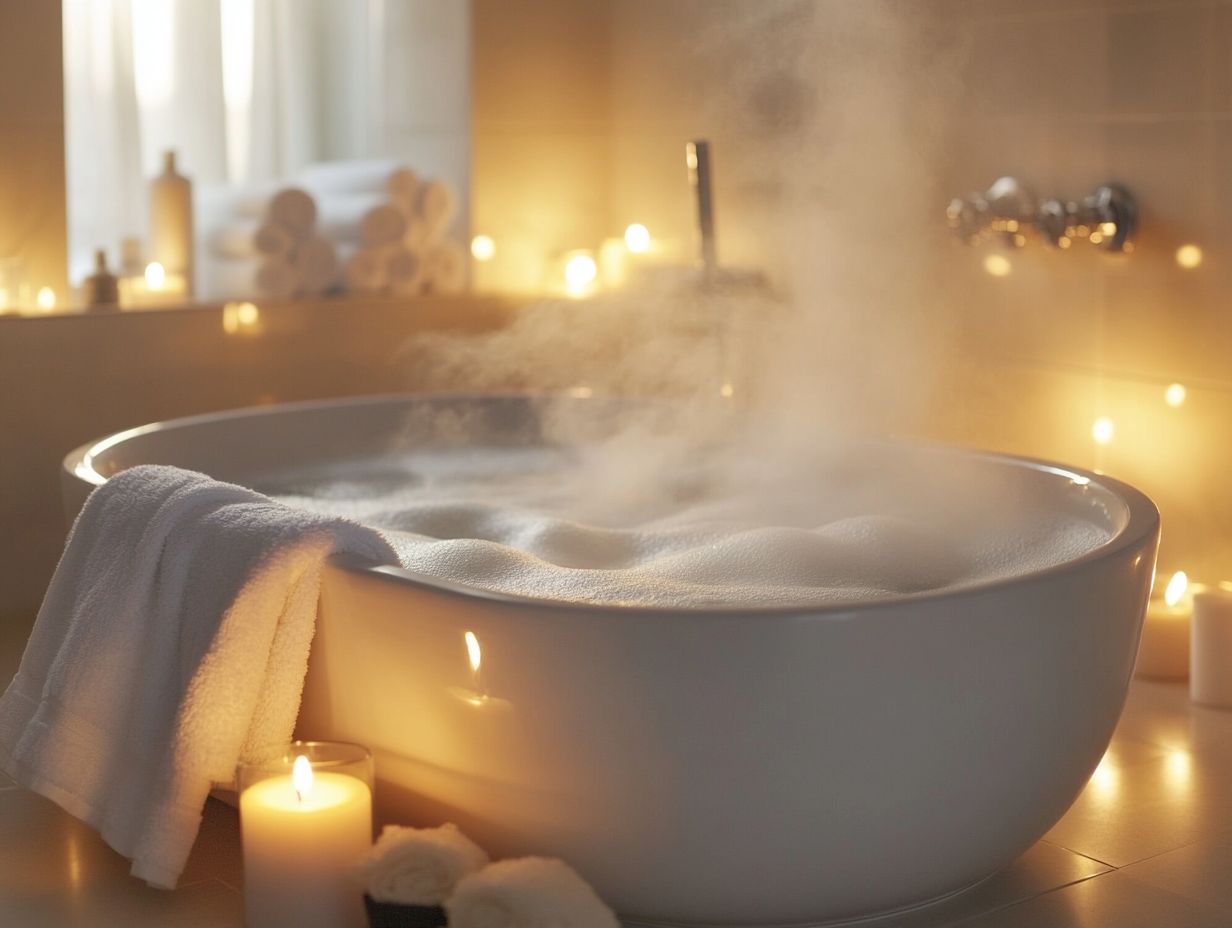
Incorporating essential oils and bath additives, such as Epsom salts (made of magnesium sulfate), can profoundly elevate your relaxation experience. These therapeutic minerals promote stress relief and soothe skin irritation, ensuring you emerge feeling rejuvenated and refreshed.
Enhancing the Relaxation Experience
Enhancing your relaxation experience can be effortlessly achieved by incorporating essential oils, bath bombs, and Epsom salts each playing a unique role in cultivating a serene atmosphere.
Essential oils, celebrated for their aromatic properties, invigorate or soothe your senses, making them ideal for crafting a personalized spa experience at home. For instance, lavender is perfect for tranquility, while eucalyptus helps clear your mind.
Bath bombs, bursting with natural ingredients, offer not just a fizzy explosion of color but also release nourishing oils and delightful fragrances, transforming an ordinary soak into a therapeutic retreat.
Epsom salts work wonders by easing muscle tension and promoting profound relaxation, ensuring that your bath time ritual becomes a holistic escape from daily stress, especially when combined with the role of nature in relaxation methods.
Tips for Creating the Perfect Atmosphere
Crafting the ideal atmosphere for your warm bath requires a thoughtful combination of soothing music, gentle lighting, and carefully selected relaxation techniques. These elements work together to elevate your self-care ritual, promoting a truly calming and restorative experience.
What s your favorite way to unwind at the end of the day? Transform your bath experience today by adding your favorite essential oils!
Creating a Calming Environment
Create a calming environment with soothing music, harmonious colors, and delightful scents that make your warm bath more enjoyable.
The music selection is crucial for setting the mood. Opt for soft instrumental melodies or gentle nature sounds to significantly lower your stress levels and elevate your overall well-being.
Colors contribute to the ambiance; soft blues and greens evoke a sense of tranquility, providing a serene escape from the daily grind.
Incorporating calming scents like lavender or chamomile through essential oils or candles creates a sensory experience that invites relaxation.
Enhance the atmosphere by curating a personalized playlist and exploring fragrance blends that resonate with you, ensuring a truly restorative and inviting space.
Frequently Asked Questions
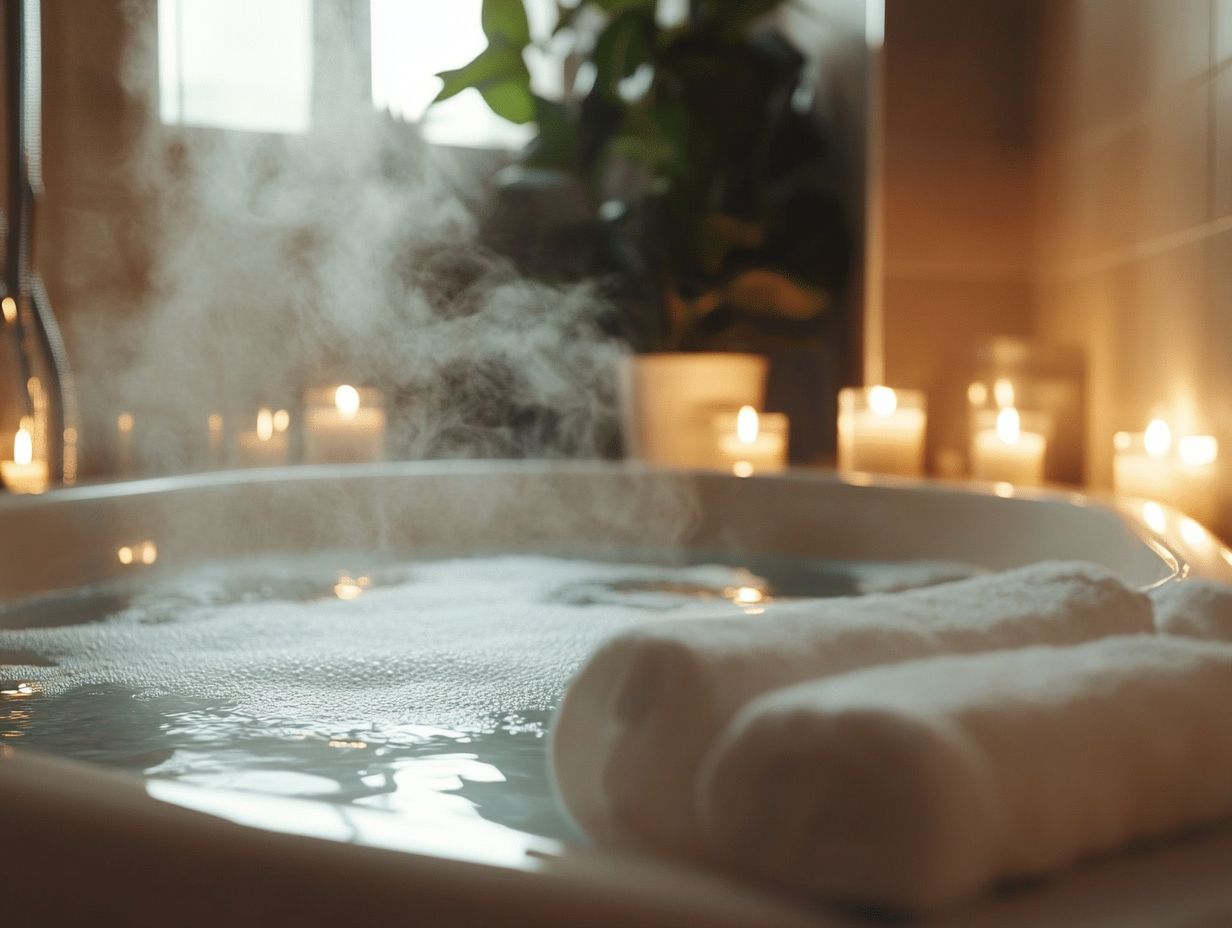
What are the benefits of taking warm baths for relaxation?
Warm baths are a fantastic way to relax both your mind and body! They help reduce stress and anxiety, improve sleep quality, and soothe muscle aches and pains.
How does a warm bath help with stress relief?
The warmth of the water stimulates the release of endorphins, hormones that help you feel happy and relaxed. Soaking in a warm bath calms the nervous system and lowers cortisol, the stress hormone.
Can taking a warm bath before bed improve sleep quality?
Yes, warm baths improve sleep quality by promoting relaxation and reducing muscle tension. The drop in core body temperature after soaking also facilitates a deeper, more restful sleep.
Do warm baths have any physical benefits for personal well-being?
Apart from relaxation, warm baths provide physical benefits such as improved blood circulation, reduced inflammation, and relief from muscle soreness or stiffness, promoting cardiovascular health.
How long should I soak in a warm bath for maximum relaxation and stress relief?
The ideal time for a warm bath is around 20-30 minutes. This duration allows your body to relax and lets the warm water work its therapeutic magic. However, you can adjust the time to fit your personal preference.
Are there any precautions to keep in mind when taking a warm bath or using hot tub therapy?
Yes, it’s important not to make the water too hot, as it can cause burns or dehydration. Limit the use of bath additives, such as bath salts or bath bombs, as they may cause skin irritation or allergic reactions. If you have any existing medical conditions, including anxiety or depression, consult with your doctor before regularly taking warm baths for relaxation.
Try incorporating these tips into your bathing routine today for a more relaxing experience!



